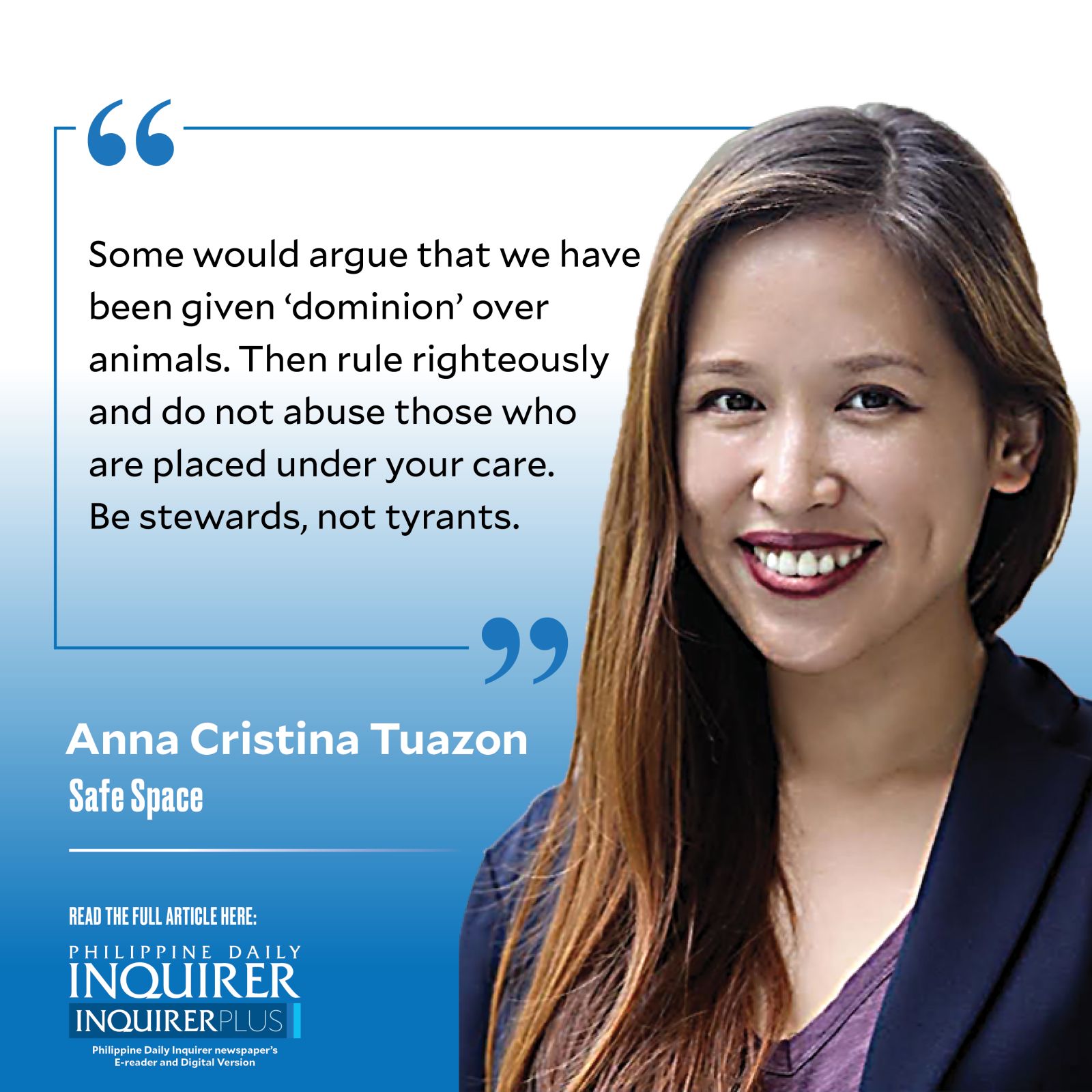Stop animal cruelty

I still remember when a neighbor threw a box of chocolate milk over our perimeter wall. Why was this so egregious? Because I had a small dog and if he had drunk it before I caught it, he would have died. It was quite a tall wall that would have made it impossible for someone to do it accidentally. I was quite certain someone had murderous intent for my dog, but I felt helpless (and scared that I had murderous neighbors). All I could do at the time was to be vigilant and never left my dog alone in our backyard.
Over the past few weeks, I have noticed increasing news stories of animal cruelty and killings. A mall security guard threw a puppy over a pedestrian overpass. Someone had shot a neighbor’s dog with a gun. More recently, a tourist’s dog went missing only to find it being feasted on by two fishermen. As a fur parent, such news—and images—broke my heart. The thought of anyone harming someone we consider as part of the family, frankly, makes me empathize with the movie character John Wick.
Perhaps it is high time we ramp up awareness of the Animal Welfare Act to ensure that people know it is not okay to hurt animals. The fact that the guard could so casually throw a puppy in front of others means that he didn’t think it was a serious crime. The Animal Welfare Act clearly states that it is unlawful to kill animals other than cattle, pigs, goats, sheep, poultry, rabbits, carabaos, and horses. It is also unlawful to torture them and cause severe neglect. The amended act also made it unlawful to abandon our pet animals without reason and due care. Violating this law would earn the perpetrator jail time and fines.
Our relationship with animals says a lot about who we are as human beings. If we treat other humans with seeming respect but display outright cruelty toward animals, it is only a matter of time before that bleeds over to human-to-human relations. There is a strong link between cruelty to animals and violence against people, including intimate partner violence and child abuse. People who are cruel to animals are more likely to later be violent toward their partners and their children. Moreover, those who display cruelty to animals are also more likely to commit violent crimes such as murder, rape, and assault.
Cruelty to animals in childhood is one of the criteria for conduct disorder, a child psychiatric condition characterized by aggressive and destructive behaviors. Keep in mind, however, that children with this disorder also tend to have experienced or have witnessed abuse themselves. People with conduct disorder are also vulnerable to developing antisocial personality disorder later in adulthood. This cycle of violence persists, and we should see animal cruelty as one of the first red flags.
Cruelty also indicates lack of empathy. In a way, cruelty can be defined as violent behavior without empathy or remorse. This is another reason why animal cruelty is something we take seriously, especially when we see it in children. It can tell us that the child is unable to consider the feelings of others or to care when somebody is in pain. The good news is that empathy can be developed. This is why I strongly advocate that we practice empathy even with groups of people that we dislike. Because once we learn to tune out empathy at certain times, it leads us to be less and less empathic in general and go toward the path of cruelty. If we make a dividing line between humans and animals in terms of cruelty, it then becomes a slippery slope in that we would feel entitled to inflicting harm toward groups of people we no longer see as “human.” In history, these have applied to ethnic minorities, to women, to children, and to sexual minorities.
It is therefore only right to take up animal cruelty with utmost seriousness. Especially when it comes to domesticated animals or household pets, we have trained them to be docile and as such become vulnerable to abusive behaviors from their owners. Dogs, for example, have the capacity to learn helplessness. Despite their physical capacity, they will choose to not fight back and stay with their abusive owners simply because they have been trained to do so.
Some would argue that we have been given “dominion” over animals. Then rule righteously and do not abuse those who are placed under your care. Be stewards, not tyrants.
—————-
aatuazon@up.edu.ph




















